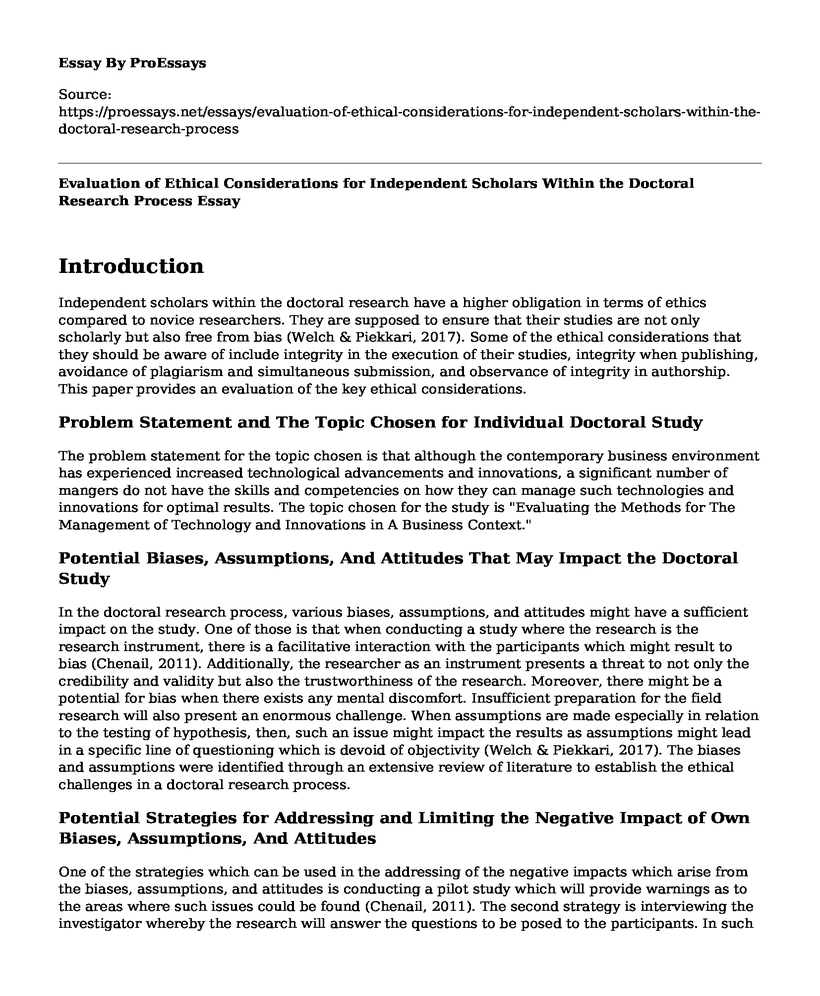Introduction
Independent scholars within the doctoral research have a higher obligation in terms of ethics compared to novice researchers. They are supposed to ensure that their studies are not only scholarly but also free from bias (Welch & Piekkari, 2017). Some of the ethical considerations that they should be aware of include integrity in the execution of their studies, integrity when publishing, avoidance of plagiarism and simultaneous submission, and observance of integrity in authorship. This paper provides an evaluation of the key ethical considerations.
Problem Statement and The Topic Chosen for Individual Doctoral Study
The problem statement for the topic chosen is that although the contemporary business environment has experienced increased technological advancements and innovations, a significant number of mangers do not have the skills and competencies on how they can manage such technologies and innovations for optimal results. The topic chosen for the study is "Evaluating the Methods for The Management of Technology and Innovations in A Business Context."
Potential Biases, Assumptions, And Attitudes That May Impact the Doctoral Study
In the doctoral research process, various biases, assumptions, and attitudes might have a sufficient impact on the study. One of those is that when conducting a study where the research is the research instrument, there is a facilitative interaction with the participants which might result to bias (Chenail, 2011). Additionally, the researcher as an instrument presents a threat to not only the credibility and validity but also the trustworthiness of the research. Moreover, there might be a potential for bias when there exists any mental discomfort. Insufficient preparation for the field research will also present an enormous challenge. When assumptions are made especially in relation to the testing of hypothesis, then, such an issue might impact the results as assumptions might lead in a specific line of questioning which is devoid of objectivity (Welch & Piekkari, 2017). The biases and assumptions were identified through an extensive review of literature to establish the ethical challenges in a doctoral research process.
Potential Strategies for Addressing and Limiting the Negative Impact of Own Biases, Assumptions, And Attitudes
One of the strategies which can be used in the addressing of the negative impacts which arise from the biases, assumptions, and attitudes is conducting a pilot study which will provide warnings as to the areas where such issues could be found (Chenail, 2011). The second strategy is interviewing the investigator whereby the research will answer the questions to be posed to the participants. In such a manner, it will be easier to identify the areas where the biases, assumptions, and attitudes could be found in the main research (Welch & Piekkari, 2017). Additionally, according to Chenail (2011), it will be critical to making sure that the researcher has a clear idea of what it feels to be interviewed. Moreover, maintaining integrity and following professional research ethics in the doctoral study forms the best methods for the limiting of the biases and assumptions.
Conclusion
In conclusion, doctoral researchers should be aware of various ethical considerations and their impacts on the credibility, validity, and trustworthiness of their studies. The problem statement for the proposed study is despite the contemporary advancements in technology and innovations, business managers fail to have strategies to use them to achieve optimal organizational results. In the study, biases will be related to the facilitative role of the researcher. The negative impacts of the biases and assumptions can be addressed via conducting a pilot study and interviewing the investigator.
References
Chenail, R. J. (2011). Interviewing the investigator: Strategies for addressing instrumentation and researcher bias concerns in qualitative research. The qualitative report, 16(1), 255.
Welch, C., & Piekkari, R. (2017). How should we (not) judge the 'quality'of qualitative research? A re-assessment of current evaluative criteria in International Business. Journal of World Business, 52(5), 714-725.
Cite this page
Evaluation of Ethical Considerations for Independent Scholars Within the Doctoral Research Process. (2022, May 17). Retrieved from https://proessays.net/essays/evaluation-of-ethical-considerations-for-independent-scholars-within-the-doctoral-research-process
If you are the original author of this essay and no longer wish to have it published on the ProEssays website, please click below to request its removal:
- Something's Rotten in Hondo Essay
- Code of Ethics in Management Essay
- Family Migration Experience Essay Example
- Teacher Induction Program Paper Example
- University Attending: My Reasons and Advantages - Essay Sample
- Essay Example on Infant Development: Caregiver Interactions and Brain Development
- Ethics: The Cornerstone of Professionalism & Life's Standards - Essay Sample







